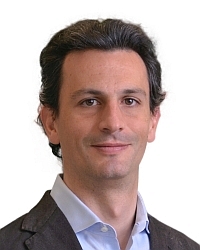TR2025-101
Geostationary Satellite Station Keeping and Collocation under High-Thrust Impulsive Control
-
- , "Geostationary Satellite Station Keeping and Collocation under High-Thrust Impulsive Control", American Control Conference (ACC), DOI: 10.23919/ACC63710.2025.11107882, July 2025, pp. 4947-4953.BibTeX TR2025-101 PDF
- @inproceedings{Pavlasek2025jul,
- author = {Pavlasek, Natalia and {Di Cairano}, Stefano and Weiss, Avishai},
- title = {{Geostationary Satellite Station Keeping and Collocation under High-Thrust Impulsive Control}},
- booktitle = {American Control Conference (ACC)},
- year = 2025,
- pages = {4947--4953},
- month = jul,
- publisher = {IEEE},
- doi = {10.23919/ACC63710.2025.11107882},
- issn = {2378-5861},
- isbn = {979-8-3315-6937-2},
- url = {https://www.merl.com/publications/TR2025-101}
- }
- , "Geostationary Satellite Station Keeping and Collocation under High-Thrust Impulsive Control", American Control Conference (ACC), DOI: 10.23919/ACC63710.2025.11107882, July 2025, pp. 4947-4953.
-
MERL Contacts:
-
Research Areas:
Abstract:
Ensuring that satellites in geostationary Earth orbit (GEO) remain in their allocated station-keeping windows necessitates accurate station-keeping algorithms. Due to the direct relationship between the fuel efficiency of station-keeping trajectories and satellite mass, optimizing propellant consumption can extend satellite lifetime, increase payload capacity, and lower launch costs. In this paper, we propose a nonlinear model predictive control (NMPC) policy for station keeping and collocation of multiple GEO satellites under infrequent high-thrust impulsive control. We develop a sequential convex programming-based approach to find locally fuel-optimal tra- jectories with enforced separation distances between collocated satellites. Numerical simulations with NASA’s General Mission Analysis Tool demonstrate the effectiveness of the proposed NMPC policy for both GEO satellite station keeping and as a collocation strategy for three GEO satellites in a single station- keeping window.
Related News & Events
-
NEWS MERL researchers present 13 papers at ACC 2025 Date: July 8, 2025 - July 10, 2025
Where: Denver, USA
MERL Contacts: Vedang M. Deshpande; Stefano Di Cairano; Purnanand Elango; Jordan Leung; Saviz Mowlavi; Diego Romeres; Abraham P. Vinod; Yebin Wang; Avishai Weiss
Research Areas: Control, Dynamical Systems, Electric Systems, Machine Learning, Multi-Physical Modeling, RoboticsBrief- MERL researchers presented 13 papers at the recently concluded American Control Conference (ACC) 2025 in Denver, USA. The papers covered a wide range of topics including Bayesian optimization for personalized medicine, machine learning for battery performance in eVTOLs, model predictive control for space and building systems, process systems engineering for sustainability, GNSS-RTK optimization, convex set manipulation, PDE control, servo system modeling, battery fault diagnosis, truck fleet coordination, interactive motion planning, and satellite station keeping. Additionally, MERL researchers (Vedang Deshpande and Ankush Chakrabarty) organized an invited session on design and optimization of energy systems.
As a sponsor of the conference, MERL maintained a booth for open discussions with researchers and students, and hosted a special session to discuss highlights of MERL research and work philosophy.
- MERL researchers presented 13 papers at the recently concluded American Control Conference (ACC) 2025 in Denver, USA. The papers covered a wide range of topics including Bayesian optimization for personalized medicine, machine learning for battery performance in eVTOLs, model predictive control for space and building systems, process systems engineering for sustainability, GNSS-RTK optimization, convex set manipulation, PDE control, servo system modeling, battery fault diagnosis, truck fleet coordination, interactive motion planning, and satellite station keeping. Additionally, MERL researchers (Vedang Deshpande and Ankush Chakrabarty) organized an invited session on design and optimization of energy systems.

